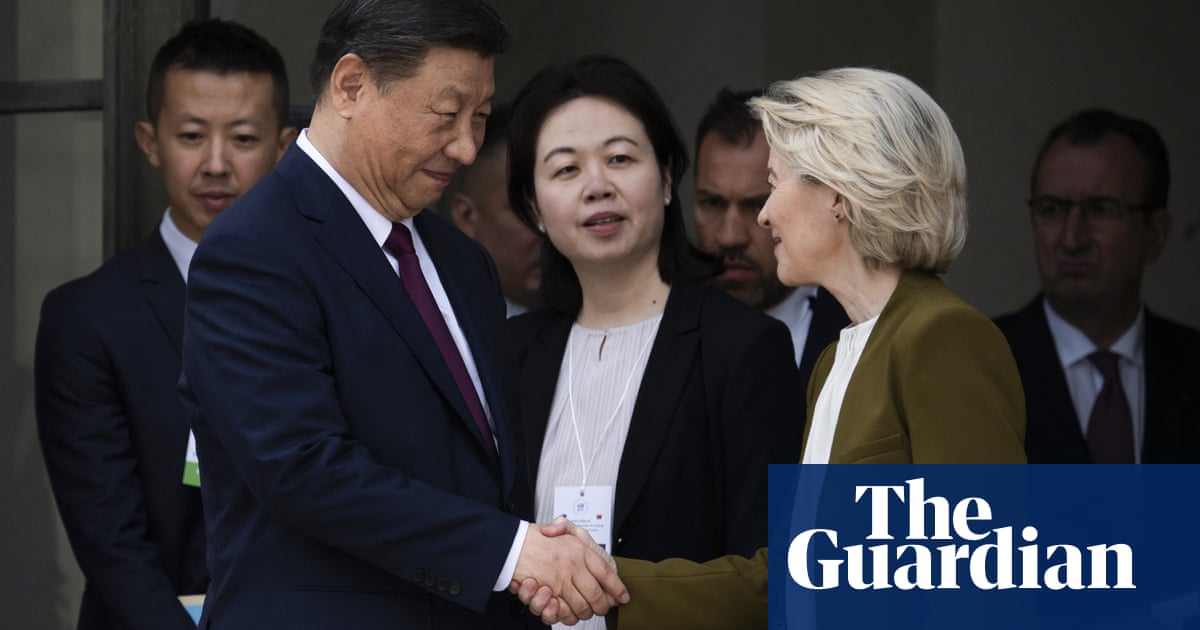The EU has restated its readiness to launch a trade war with China over imports of cheap electric cars, steel and cheap solar and wind technology, with Ursula von der Leyen saying the bloc will “not waver” from protecting industries and jobs after a meeting with the Chinese president, Xi Jinping, on his multi-day tour of Europe.
The European Commission chief said she was “convinced that if the competition is fair” from China, then Europe “will have thriving durable economies”.
But she said the “imbalances” caused by state support for Chinese industry leading to cut-cost products threatened jobs in Europe, and that was “a matter of great concern”.
“Europe will not waver from making tough decisions needed to protect its economy and security,” she said.
Her warning, came less than two hours after a cordial meeting at the Élysée Palace between the Chinese president and Emmanuel Macron, his French counterpart.
In a video released before the bilateral talks between Xi and Macron, at which von der Leyen was present, Macron said the need for a Europe-China dialogue was “greater than ever … because of the international situation”.
He added that coordination with China over “major crises” including Ukraine and the Middle East was “absolutely decisive”.
In response, Xi said his country and the European Union should strengthen their “strategic cooperation” and remain “partners” despite numerous disputes ranging from trade to human rights.
“As two major world powers, China and the EU must remain partners, pursue dialogue and cooperation, deepen strategic communication, strengthen strategic mutual trust, consolidate strategic consensus and engage in strategic coordination,” the Chinese leader said at the start of the trilateral meeting.
A joint press conference by the two leaders after talks on the first day of the visit, glossed over the thorny question of trade relations between the two countries.
A bottle of exclusive Louis XIII cognac was among the gifts Macron gave Xi, a nod to Beijing opening an anti-dumping probe into French cognac. Macron praised his counterpart for his “open attitude” towards the inquiry and added France hoped its products could continue having access to the Chinese market.
There was no mention of human rights issues that Beijing critics hoped Macron would raise. On Monday morning, Raphaël Glucksmann, head of the Socialist party list for the European elections, criticised the welcome given to the Chinese leader saying “he is not our friend …”
The EU’s more robust stance on trade with China dovetails with Washington’s approach. The US treasury secretary, Janet Yellen, has warned China that Washington would not accept new industries being “decimated” by Chinese imports.
After the trilateral meeting, von der Leyen was blunt but insisted China had time to change direction.
She said they had an “honest and open exchange and discussion where we see eye to eye and on points where we have differences”.
Together with Macron they spoke about the geopolitical situation and how both the EU and China had a “shared interest in peace and security” with a strong role to play in relation to the war in Ukraine.
There has been repeated talk of China acting as a peace broker although it is not expected to attend a planned peace conference in Switzerland. Von der Leyen praised Xi for the “important role” he played in “de-escalating Russia’s irresponsible nuclear threats“ and said the EU counted on China “to use all its influence on Russia” to end the war.
But it appeared on Monday that tensions on the economic front show no sign of abating with several EU investigations ongoing into China’s ability to undercut EU rivals in cars, steel, wind turbines, solar panels and medical devices.
Last September, von der Leyen announced an investigation into alleged state support for the Chinese electric cars, with conglomerate BYD launching an EV last year in the EU market at under €30,000 (£25,700).
The competition commissioner, Margrethe Vestager, last month announced the EU would use its foreign subsidies regulation to launch an inquiry into Chinese wind turbine manufacturers.
EU manufacturers have complained that not only is the price for Chinese wind turbines up to 50% lower than homegrown ones but that they are offering authorities general terms including deferred payment schemes.
The EU has been arguing that it is the largest free market in the world and China is essentially abusing its economic hospitality by dumping product in Europe rather than damping down production or ramping up demand in China.
Beijing argues that EU manufacturers have access to an even bigger market in China and with a global demand for green tech growing everyone can flourish together.
Green tech companies have protested that while they once had a lead on producing wind turbines and solar panels they are now being put out of business by China.







